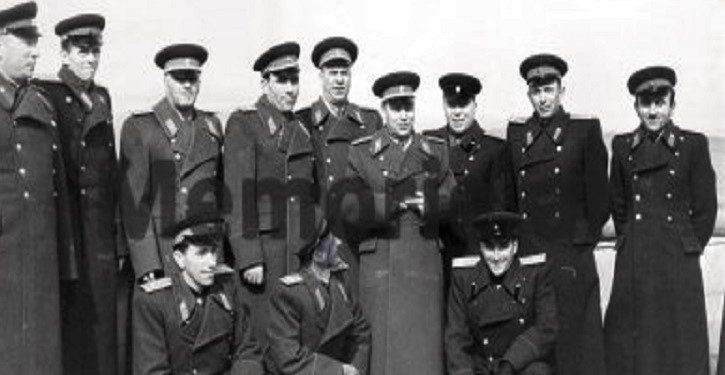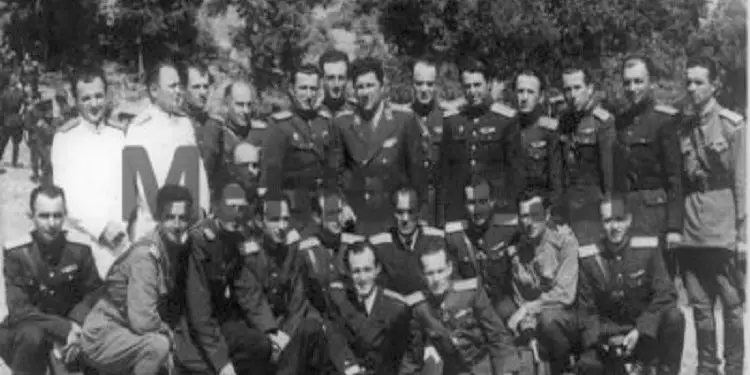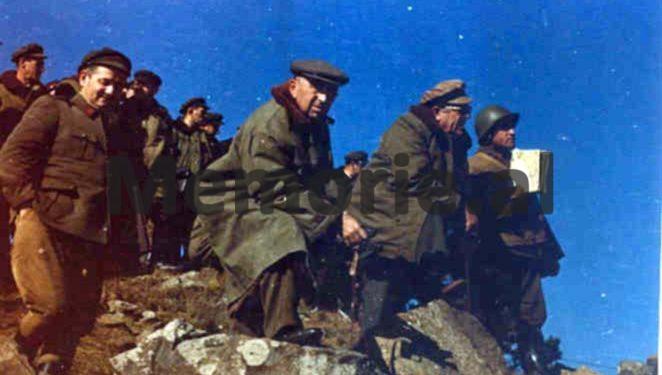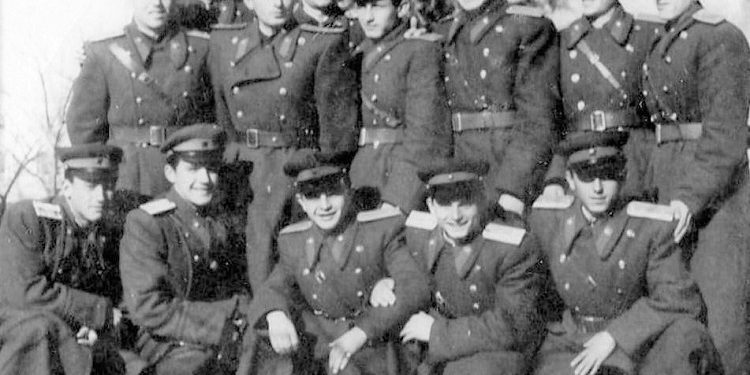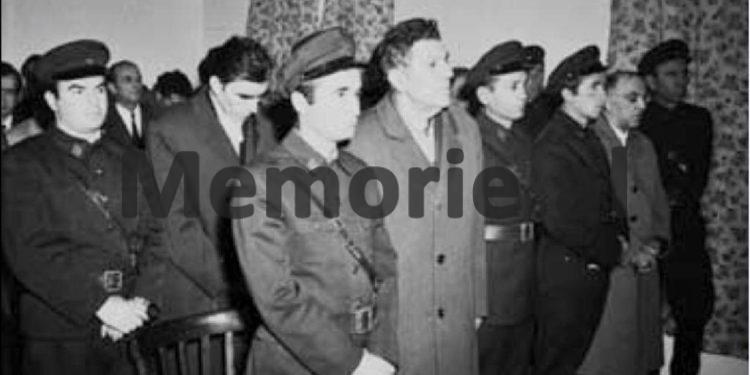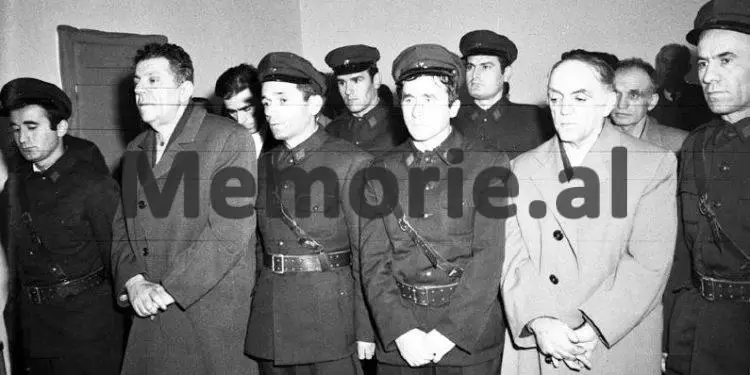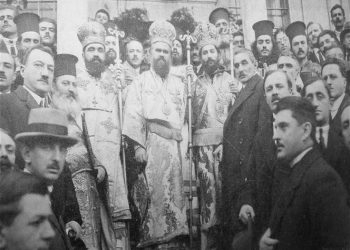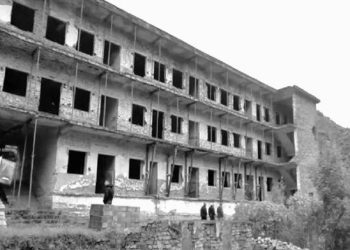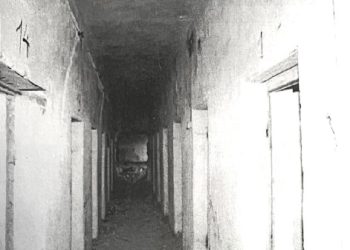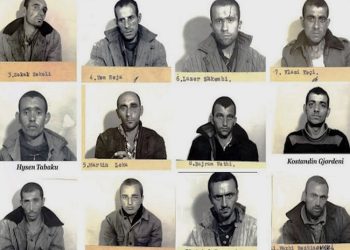By Dr. Etleva SMAÇI
The second part
The metamorphosis of the “class enemy” in the ranks of the People’s Army, from the “declassed officer” to the “putschist officer and police-agent officer”, in the years 1954 – 1983
Memorie.al / This paper aims to analyze the metamorphosis of the “class enemy” in the ranks of the People’s Army, in the time period 1954 – 1983. To carry out this comparative analysis, the paper will refer to three important moments, when the Army became a target for the detection and elimination of the professional and, even physical, “enemy”. The People’s Army, during the period of the communist dictatorship, was one of the most important ideological tools in the war against the “class enemy”. And yet it could not escape this “virus”, but on the contrary, it produced its own model of the “class enemy”, which was seen as the main threat to the longevity of popular power and the dictatorship of the proletariat.
Continues from the previous issue
Next to the name of doctor Vangjel Masha, on his characteristic sheet, there is the note; “When did you enter, by whom did you enter the army”? His origin (Greek/minority nationality) was another element to declare him “unsuitable”. Even doctors, like topographers, were seen as necessary, given the lack of trusted staff. The same argument was used for their release. Already the army had trusted cadres trained in the Soviet Union. “Unwanted” military doctors were placed at the disposal of the Ministry of Health and instead of them, doctors who had political guarantees would be brought.
c)- “Balli” sympathizers, kulaks and hiding the past
For the rest of the officers on the name list, the main reason for considering them as; “inappropriate”, is the hiding of the past, in particular the connections with ‘Balli’. Some of these officers were for a period members or candidates of the party, but were expelled from it, when these connections came to light. Such cases are those of lieutenants Anastas Dhimitri, Selman Abas Karoshi and lieutenant Sabah Xhemal Meçe. The note, these last two on the characteristic sheet, is; “Out”, which means their immediate departure from the ranks of the Army. The purge of the Army in ’53-shin’ was actually not separated from the previous period, where the Army had continuously produced “enemies”. It was an officialization with a concrete platform, of the class war in the Army, to be transformed into the war within the type, no further than in the following two decades.
The “putschist” generals, “enemies of the party and the people”!
The blow made in 1974 was not a blow of the “inappropriate”. The strike was of the entire Albanian military caste, or as it is known otherwise; “purging the generals”, who had developed their “hostile anti-party and anti-state” activity, using the high positions they held in the party and the army.
The figures hit in 1974 were all supporters of the communist regime, and it can even be said without fear that they had cemented the dictatorship of the proletariat, teaching the class war and unmasking the “enemy” in the ranks of the Army. Therefore, the so-called “putschists” (without performing any action that could be considered as such), constitute the metamorphosis of the portrait of the “enemy of the people”, since they were not only military cadres who had left the partisan units, but until the day of at the end of their lives, they proved to be loyal to the Party and were shot with the last word; “Long live the Party”!
Browsing the voluminous files from the activity of the Ministry of People’s Defense, held in July 1974 in Durrës and until the sentencing by decision of the Presidium of the People’s Assembly, for the death sentence of Beqir Balluku, Petri Dumas and Hito Çako, it is clear that there is no moment that these senior military officers have carried out any hostile activity against the Party and the Army, let alone accept the claim of a military coup. On the contrary, they were idealistic and loyal, which is clearly reflected in their self-criticism. Moreover, they felt themselves to be an integral part of the political and military structures of the communist state.
The materials of the investigative files of the State Security are filled with hundreds of notes that clearly reveal the new “enemy of the people” model. The “enemy” that was born as a result of internal intrigues, clashes between the military ruling caste, the “enemy” that was discovered on the basis of public denunciations and unmasking and that was then fabricated in the State Security bodies. (The former General Prosecutor, Rrapi Mino, admits such a fact in an interview given to the “Panorama” newspaper).
The file that was presented at the trial of the putschist generals and that would serve as the raw material for accusations, was filled with denunciations from the field. In the role of Hysni Kapo’s assistant, to follow the verification of complaints and compromising data for the Minister of Defense Beqir Balluku or other major figures of the Ministry of People’s Defense, but also for other officials, or members of the Central Committee, prosecutors , and even judges, he sheds light on the “special line”, which served the communist regime, for verifying the purity of the image of the functionaries of the high communist regime.
And although the main charge was that of treason, the former prosecutor admitted that this charge was formulated “in general terms”, since the biggest denunciations were related to the moral degeneration of the central figures of the Army and abuse of the people’s wealth. In fact, the various letters addressing the hostile activity of Beqir Balluk and his group are interesting to study, to understand on what criteria they were labeled “enemies of the party and the people”!
On the other hand, the denunciation chain involved a wide circle. At the end of the process, those who initiated the denunciations and unmaskings ended up labeled as; “enemies”. The letter of Tonin Jakovo, about his relationship with Beqir Balluku, is very interesting. He explains that his visits to Beqir Balluk’s house began after 1966, considering him as a “neighbor”.
But he denies having close family company. Analyzing the conversations held during the visits, Tonin Jakova states that; “Beqir Balluku has not expressed opinions contrary to the line and position of the party, no expression of his has attracted my attention. Now after his unmasking, as an enemy of the Party, I thought about remembering some of his hostile performances, but I don’t remember anything”. Tonin Jakova, makes self-criticism through the letter that; “in the light of the teachings of the Party and Comrade Enver, I see that I should have been vigilant, his performances and weaknesses, I should have looked at them with a critical eye and reacted at least a little.
I understand that this is a weakness for me, microbourgeois weakness. This means that I did not take into account the teachings of the Party and Comrade Enver, in the case of my relations with Beqir Ballku. I, Beqir Balluk, condemned him with hatred as an enemy of the party and the people, as a conspirator with an extremely dangerous activity, for our party and our country”.
Apparently, Tonin Jakova’s confession was not enough, so I asked him to delve into self-criticism. Hysni Kapo informs Enver Hoxha about Tonin Jakovo’s letter. The letter begins with a paradox; “Tonini admits that he boiled brandy with Beqir’s cauldron, Balluk. I told him that he should have spoken in time about everything he knew about Beqir Balluku, that he should not have waited for others to tell him. He should come and tell the Central Committee himself, which he didn’t do.” On December 6, Tonin Jakova would make a self-critical addition, where she would complete the portrait of the “enemy” of Beqir Balluku with new data.
“When I got the TV, he gave me an antenna that was too much, he gave me some poles for the vines, a small buoy. Once he sent me wild boar and fish. I should have said in detail as much as I knew about his bourgeois, degenerate character, who trampled and trampled the norms of the Party. In this attitude, the wrong opinion that I had influenced, that such things that I knew about the character of Beqir Balluk, about what he did were known and recognized by many others and he was unmasked in this direction.
I now reflect that these thoughts I had are not right and I was wrong. Because Beqir Balluku was an enemy and as such he must be unmasked to the end, not only for his hostile activity, in the political and military field, but also as a completely morally degenerate man, because political degeneration and moral degeneration, are connected to each other”.
Similar denunciation letters addressed to the so-called “coup-makers” are found in the archive, and reading them gives the impression that the “witch-hunt” was inspired not by the fear of a possible military coup (which was unlikely to happen by people who strictly followed the directives of the regime), but from the rivalry between the major figures of the Army themselves, which created the perfect environment for a launch tragedy as; “enemies of the dictatorship of the proletariat, underminers of popular military art, defeatists and capitulators, in the face of imperialist and revisionist military art”.
In the speech of July 10, 1978, Enver Hoxha would portray the “enemy” Beqir Balluku, as; the “traitor” who supported a capitulating military art, which was based on the pro-American military art theories of Chu En Lai (it was the time when Albania declared the defense and construction of socialism, with its own forces) and Tito, “who intended to open the gates to NATO”. Among the “other sins”, the trio Balluku, Čako and Dume, that of the political agents, “agents of the Soviets, Yugoslavs and the Chinese”, would be charged.
The purge by “poli-agents”!
In the years 1981-’82, the murder of Mehmet Shehu and the shooting of Kadri Hazbiu took place. The first had been the Minister of Defense, the second from the Minister of the Interior, Minister of Defense. Mehmet Shehu’s suicide was a very good alibi for the next purges within the Army, for which Enver Hoxha had strong doubts, that he had been under the control of these two figures, eliminated as “enemies of the people and police agents “.
Just like other times, in such situations, the State Security and that of the Army attacked the Army and its cadres. The scheme of discovering the “enemy group” was almost similar to the one followed in 1974, with the “coup group”, organizing meetings with party committees, denunciations and unmaskings by the masses.
But now the object was the very weapon of the State Security, including the branch of the Army Security. In the information on the moral and political condition of the Army during this period, it is emphasized that; “The army remains an important object of the enemy’s activity. The most widespread is agitation and propaganda. It has aimed to hit the Party’s line, in foreign policy but also in the field of economy, to lower confidence in the ability to defend the country, it tries to raise doubts about the hostile activity of Mehmet Shehu and his followers”.
One of the reasons that the Army was hit in this period was the fear of the reaction of those who the system considered “nostalgic” of Mehmet Shehu and Kadri Hazbiu. In a material prepared by the 1st Directorate of the Ministry of Internal Affairs, which Hekuran Isai sent to the Secretary of the Central Committee of the ALP, Ramiz Alia, regarding the hostile activity developed in the Army during 1982, he provided the data the following statistical.
“For the year 1982, 38 officers, 7 officers and 70 soldiers were prosecuted for hostile activities). 56% of the persons prosecuted for hostile activity in the ranks of the Army, were prosecuted under the article “propaganda agitation”! It is also proven within the material that; “The enemy element in the ranks of the Army has opposed the materials of the Central Committee of the Party and its decisions, defending the enemies Mehmet Shehu, Kadri Hazbiu, Feçor Shehu, etc.
Conversations with a hostile character of this form have been held in close circles, in most cases only with associates. So there was no width in the distribution of persons”. So the enemy of the 80s was a very sophisticated enemy. He knew the Army and the Security forces well and had established connections with agencies abroad.
According to the information, this was one of the biggest concerns, since in the Army; “It was a trend of espionage for which 15 people were followed. The fact that we have evidenced the interests of diplomatic missions to gather secret information for the Army, associations of military personnel with persons of bad political composition and even uncontrolled conversations, dictate the need to follow these problems better than until now. in order to detect espionage activity”. Those who carry out this hostile activity are mainly of young age and low-ranking cadres (battalion commander and below). There were communists among them.
The peak of the arrests reached in 1985-1986, when over 20 army cadres and non-commissioned officers were arrested. The State Security, in cooperation with the Investigation and Prosecution bodies of that time, with defamation, with intrigues and with fabricated sources, among the most shameful, arrested and sentenced a mass of cadres, without any facts or legal arguments. One of the convicts of this period, Colonel Naim Muho, testifies that; “Two months before I was arrested, I was given a decoration for ‘Outstanding Activity in the Field of Defense'”.
Just two months after the decoration against him, the court process started. In the style of the State Security, the room where Naim Muho lived in the Lushnje Officers’ House was bugged. His dismissal from the post of commander of the Lushnja Division took place in the office of the Minister of Defense, Simon Stefani, in the presence of 4 members of the Political Bureau.
The dismissal was followed by an arrest and a year-long investigation that ended in a trial; “with false witnesses brought by the side, Security officers”. Muho was sentenced to 13 years in prison. But the persecution of the State Security continued with his family, which, as he claims, consisted of 6 women, 4 daughters who were still alive, a sick wife and a mother on the verge of death. The whole family was put under investigation, or as he puts it; “the whole family, with spies behind”. To understand to what extent the Army was an object of the Security in this period (but not only), the testimony of the former President of the Republic, Alfred Moisiu, who was one of the “enemy elements”, speaks clearly and shockingly. the years 1983-’86.
In a confession given to the “Shekulli” newspaper in 2008, he says that; “In 1982, at a meeting of the Party Committee of the Ministry of Defense (where I was a member; action had not yet been taken against me, so I had not yet been posted), where the problem of the then Chief of Army Security was discussed , who had been a friend of Feçor Shehu and was punished, as was the custom, they started harassing him; ‘go deeper, go deeper’ and among other things, he said that Feçori, the heads of the Army Security, gathered them once a month, where he asked them to account for why they did not carry out the arrest plan. When I heard this, to be honest I was very shocked.
I asked myself the question: How is it possible to do this with the life, dignity and honor of people?! I knew that there is a plan for wheat, for potatoes, etc., but a plan to arrest and destroy people’s lives, I did not perceive this”!
CONCLUSIONS
To give a conclusion on the metamorphosis of the “enemy of the people”, in the ranks of the People’s Army, we will quote a fragment from a statement given to the Albanian Radio-Television, by Pjetër Arbnori: “In the cells of the Burrel prison, it was almost the entire General Staff of the Partisan Army were the commanders of the brigades, while only a few mummies were left outside, whose turn had not yet come to be isolated”.
So the “enemy of the people” were those who had contributed to the establishment of the communist regime, had supported it to strengthen the foundations, who had made sacrifices on these foundations, the “outclassed”, with the platform of 1953. But with myopia politicians, failed to understand that the built mechanism would turn them from executioners to victims, since the paranoia of the communist dictator, who saw “enemies” everywhere, could not save the high-ranking soldiers and the Army. Also, the “enemies” announced in the two radical campaigns of purges were made-up enemies.
Most of the evidence against them came from criticism, forced self-criticism or from the forced confessions of those arrested, under the effect of inhumane torture. They are evidence of the depersonalization of senior military officers, who, under accusations of planning military coups, or the overthrow of the government, were the alibi of the communist regime, to create in the people the image that in our country, hidden enemies were operating, preventing progress of Socialism and the Dictatorship of the Proletariat.
In this way, the military purge was not a deliberate removal of potential challengers to the power of dictator Enver Hoxha, but a manifestation of his worldview and tendency to expose imagined enemies. And their strike was done in the name of the people. The message conveyed to the population, obviously had a double effect. Terror, but also alienation of the individual. The fear that the enemy tomorrow would be you, led to denunciations even within the family, even though the end was the same, for the denounced and the denouncer. Memorie.al
Lecturer at the Academy of the Armed Forces, Department of Strategy and Military History




